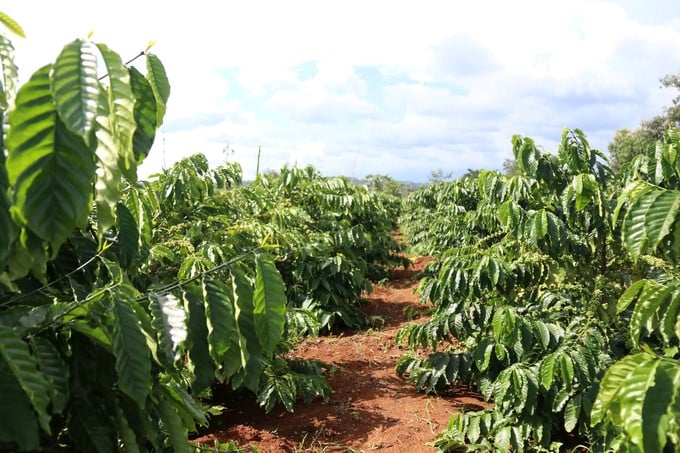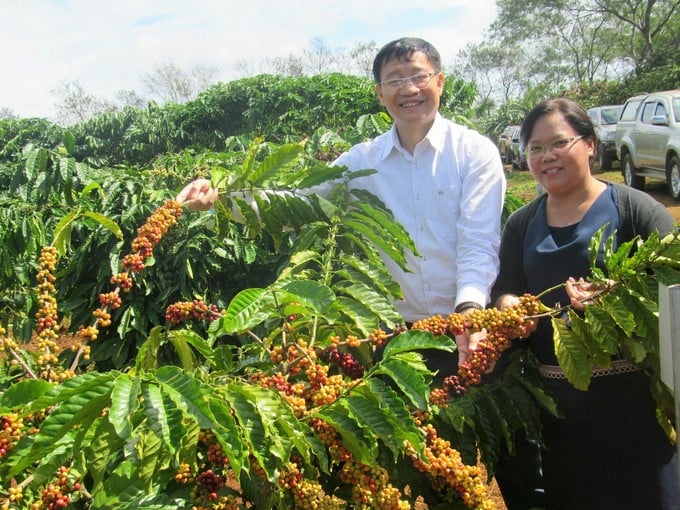May 29, 2025 | 08:03 GMT +7
May 29, 2025 | 08:03 GMT +7
Hotline: 0913.378.918
May 29, 2025 | 08:03 GMT +7
Hotline: 0913.378.918

Coffee varieties transferred to people by the Western Highlands Agriculture and Forestry Science Institute achieve high productivity. Photo: Quang Yen.
According to Dr. Phan Viet Ha, Deputy Director of the Western Highlands Agriculture and Forestry Science Institute (WASI), the Institute carries out the transfer of coffee varieties in many forms, such as: providing seedlings nursed at the Institute; supplying shoots or grafted seedlings on site; transferring in the form of hybrid seeds (Robusta coffee), purebred seeds (Arabica coffee), or tissue culture seedlings.
"The Institute carries out the transfer of coffee varieties in a various way, suitable to the weather conditions of each locality as well as people's needs, through three Centers located in three major coffee development localities of the Central Highlands: Gia Lai, Dak Lak, and Lam Dong," Dr. Ha said.
According to statistics, the area of replanted and grafted coffee in five Central Highlands provinces in the 2018-2023 period is estimated to reach 105,027 hectares, of which about 70,000 hectares are replanted.
Currently, WASI has built gardens to produce TRS1 hybrid Robusta coffee seeds to provide seeds for production with an area of 15 hectares. Annual seed production output can reach 30 tons. At the same time, WASI has expanded the nursery system to produce coffee seedlings for replanting on a scale of over 5 hectares.

TRS1 coffee variety is the main variety serving coffee replanting in the Central Highlands in recent years as well as today. Photo: Quang Yen.
Besides, in the 2018-2023 period, Nestlé Vietnam Company, in collaboration with WASI, provided farmers with 5.88 million TRS1 Robusta coffee seedlings on an area equivalent to 5,880 hectares.
In addition to providing the TRS1 hybrid Robusta coffee variety for the above-mentioned programs, the Eakmat Coffee Research and Technology Transfer Center (under WASI) has produced to supply farmers in the 2018-2023 period with 15 tons of TRS1 Robusta coffee seeds, 2 million TRS1 oyster-leaf seedlings, and 2.5 million TRS1 Robusta coffee seedlings (area equivalent to 19,500 hectares).
Furthermore, the Pepper Research and Development Center (under WASI) has built 2 hectares of TRS1 hybrid Robusta coffee seed production garden since 2015. The amount of seeds produced from 2018 to 2023 reaches about 10 tons.
WASI, its subordinate units, and seed garden in Gia Lai and Kon Tum provinces have produced and supplied TRS1 hybrid Robusta coffee seedlings and seeds to farmers for replanting in the Central Highlands provinces during the 2018-2023 period, with an area of over 49,680 hectares, accounting for about 70% of the replanting area of the entire region in the recent 5-year period.
The goal for the 2022-2025 period is that the Central Highlands provinces will replant and graft for renovation about 107,000 hectares of coffee, of which 75,000 hectares will be replanted, and the TRS1 hybrid Robusta coffee variety will continue to be the main variety for coffee replanting today.

Over 80% of the coffee area in the Central Highlands uses varieties researched and created by the Western Highlands Agriculture and Forestry Science Institute. Photo: MP.
"Regarding grafted trees, we can supply shoots and grafted seedlings on site or through support programs and projects for farmers. Typically, the VnSAT Project has built seed gardens and nurseries in each district so that farmers can access new varieties right in each area. In my opinion, farmers now understand this transfer very well," said Master Dinh Thi Tieu Oanh, Head of the Industrial Crops Department (WASI), adding that the Institute is ready to open technical training and guidance classes to help farmers fully access the technical process of cultivating new coffee varieties.
Mr. Le Van Hien (village 10, Hoa Thang commune, Buon Ma Thuot city, Dak Lak) said that his family is currently growing 1 hectare of coffee. Previously, he used old varieties, so the disease resistance was poor and the productivity was low, only reaching 2–2.5 tons/ha.
"In 2010, I renovated, replanted, and planted new varieties researched by WASI, including varieties TR4, TR9, TR11, and TR12. Thereby creating a breakthrough in productivity, reaching 4–4.5 tons/ha, even 6–7 tons/ha with good intensive farming. In addition, the Institute's new varieties are also more resistant to rust and drought than old varieties, while the care process and techniques are the same as old varieties," shared Mr. Hien.
According to Master Dinh Thi Tieu Oanh, cloned coffee varieties or seed-based coffee varieties are transferred by the Institute to farmers at district and even commune levels. Farmers can buy seeds for production and will be notified on the media system as well as the Institute's website so that they can buy the right seeds and avoid fake sites.
Translated by Thu Huyen
/2025/05/25/4127-3-073637_820.jpg)
(VAN) Thanks to the promotion from an FAO-implemented project, vegetable production in greenhouses in Moc Chau has seen strong development, from 1.5 hectares in 2021 to nearly 50 hectares in 2024.

(VAN) FAO has recently supported USD 140,000 to implement the project 'Risk mitigation human-animal interface risks through disease control initiatives in pig farming.'

(VAN) The People's Committee of Tra Vinh province has approved an adjustment to the investment policy for the Green Hydrogen Plant project, increasing its area to approximately 52.76 hectares.
![Reducing emissions from rice fields: [2] Farmers’ commitment to the soil](https://t.ex-cdn.com/nongnghiepmoitruong.vn/608w/files/news/2025/05/05/dsc08881jpg-nongnghiep-140632.jpg)
(VAN) Clean rice cultivation model in Thuong Tan commune, Bac Tan Uyen district, is assisting local residents in achieving sustainable agriculture by substantially reducing costs, increasing productivity, and protecting the environment.

(VAN) At the conference to disseminate Resolution No. 68, AgriS introduced its digital agricultural ecosystem and reaffirmed its commitment to accompanying the Government in promoting private sector development and sustainable agriculture.

(VAN) 'Blue Ocean - Blue Foods' initiative is designed to restore marine ecosystems and establish sustainable livelihoods for local communities by cultivating a minimum of 1,000 hectares of cottonii seaweed in the first three years.
/2025/05/21/4642-3-112707_603.jpg)
(VAN) The V-SCOPE project has made direct contributions to three out of six pillars of the Comprehensive Strategic Partnership between Vietnam and Australia.